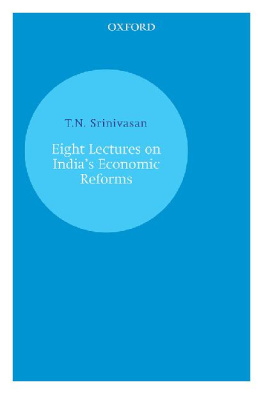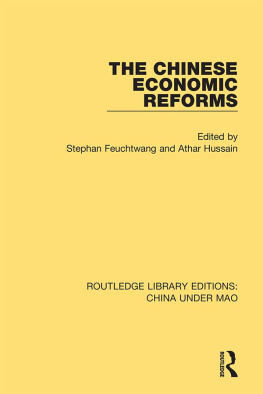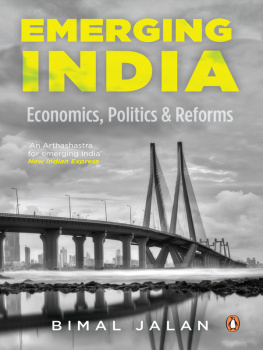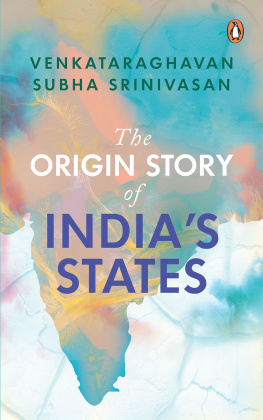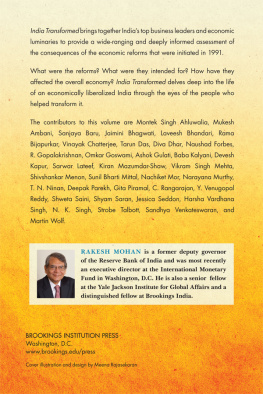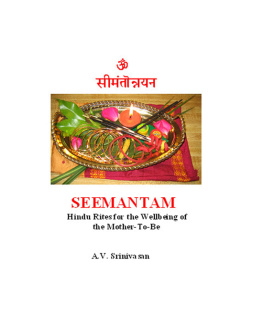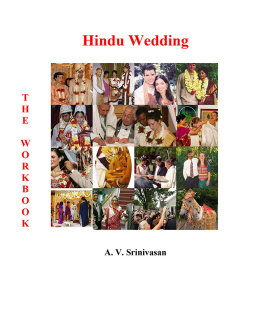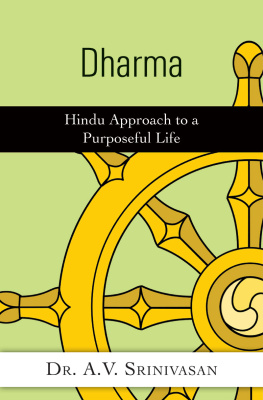Eight Lectures on
Indias Economic Reforms
Eight Lectures on
Indias Economic Reforms
T. N. Srinivasan
YMCA Library Building, Jai Singh Road, New Delhi 110 001
Oxford University Press is a department of the University of Oxford. It furthers the
Universitys objective of excellence in research, scholarship, and education
by publishing worldwide in
Oxford New York
Auckland Cape Town Dar es Salaam Hong Kong Karachi Kuala Lumpur Madrid
Melbourne Mexico City Nairobi New Delhi Shanghai Taipei Toronto
With offices in
Argentina Austria Brazil Chile Czech Republic France Greece Guatemala
Hungary Italy Japan Poland Portugal Singapore South Korea Switzerland
Thailand Turkey Ukraine Vietnam
Oxford is a registered trade mark of Oxford University Press
in the UK and in certain other countries
Published in India
by Oxford University Press, New Delhi
Oxford University Press 2000
The moral rights of the author have been asserted
Database right Oxford University Press (maker)
First published 2000
Oxford India Paperbacks 2000
All rights reserved. No part of this publication may be reproduced,
or transmitted in any form or by any means, electronic or mechanical,
including photocopying, recording or by any information storage and
retrieval system, without permission in writing from Oxford University Press.
Enquiries concerning reproduction outside the scope of the above should be
sent to the Rights Department, Oxford University Press, at the address above
You must not circulate this book in any other binding or cover
and you must impose this same condition on any acquirer
ePub ISBN-13: 978-0-19-908768-6
ePub ISBN-10: 0-19-908768-7
Printed in India at Anvi Composers, New Delhi 1100063
Published by Oxford University Press
YMCA Library Building, Jai Singh Road, New Delhi 110001
Contents
ADM | anti-dumping |
ADR | American Depository Receipts |
BIFR | Bureau for Industrial and Financial Restructuring |
BOP | Balance of Payments |
BOT | Build Operate Transfer |
CRAR | Capital to Risk-weighted Asset Ratio |
DOT | Department of Telecommunications |
DPAP | Drought Prone Areas Programme |
DPEP | District Primary Education Programme |
DWCRA | Development of Women and Children in Rural Areas |
EAS | Employment Assurance Scheme |
FDI | Foreign Direct Investment |
FIIs | Foreign Institutional Investors |
FIPB | Foreign Investment Promotion Board |
GATS | General Agreement on Trade in Services |
GDP | Gross Domestic Product |
GDR | Global Depository Receipts |
ICDS | Integrated Child Development Services |
IEG | Institute of Economic Growth |
IRD | Integrated Rural Development |
IRDP | Integrated Rural Development Programme |
ISEC | Institute for Social and Economic Change |
JRY | Jawahar Rozgar Yojna |
LRS | Labour Reserve Service |
MFN | Most Favoured Nation |
MIDS | Madras Institute for Development Studies |
NBFI | Non Bank Financial Institutions |
NDP | Net Domestic Product |
NPA | Non Performing Assets |
NRI | Non Resident Indians |
NTPC | National Thermal Power Corporation |
OGL | Open General License |
PDS | Public Distribution System |
PMO | Prime Ministers Office |
PSEs | Public Sector Enterprises |
PSUs | Public Sector Undertakings |
PTAs | Preferential Trade Agreements |
PW | Public Works |
QR | Quantitative Restrictions |
SAPTA | South Asian Preferential Trade Agreement |
SEBI | Security and Exchanges Board of India |
SERC | State Electricity Regulatory Commission |
TAMP | Tariff Authority for Major Ports |
TFP | Total Factor Productivity |
TIFR | Tata Institute of Fundamental Research |
TRAI | Telecommunications Regulatory Authority of India |
TRYSEMS | Training of Youth and Self-employment Programmes |
UNDP | United Nations Development Programme |
VAT | Value Added Tax |
WTO | World Trade Organization |
I was indeed greatly honoured and privileged to be the first holder of the endowment professorship established by the Institute for Social and Economic Change (ISEC), Bangalore in memory of its founder, Dr V.K.R.V Rao. I thank Dr P.V Shenoi, its former Director, and the Governing Board for bestowing this honour on me. I spent March and July 1998 at the Institute and very much enjoyed my stay in the peaceful, green and lovely campus. I wish to thank Dr P.V. Shenoi, the faculty and staff of ISEC and the Registrars, Dr S.N. Sangita and Dr V. Reddy, for their ever courteous and generous hospitality during my stay.
My association with Dr Rao dates back to 19623 when I spent a year at the Institute of Economic Growth (IEG) in Delhi, another of Indias great research institutions in economics founded by him. During my tenure at the Indian Statistical Institute (ISI), Delhi during the sixties and seventies, we met occasionally in Delhi and Bangalore. I fondly remember the warm hospitality of Dr and Mrs Rao whenever I visited their homes. Dr Rao, a distinguished economist and statesman, was above all, an institution builder. In all three institutions he built, namely, the Delhi School of Economics, IEG and ISEC, Dr Rao emphasized the inter-relationships among all social sciences by having talented sociologists, social anthropologists, and political scientists as well as economists from all parts of India on the faculty.
I had the privilege to personally know another great scholar-institution builder, Professor P.C. Mahalanobis of the ISI. Through my old classmates at Loyola College, Madras, who went on to work as mathematicians at another great institution, the Tata Institute of Fundamental Research (TIFR) I came to know of its guiding spirit Dr Homi Bhabha. Each of these three towering personalities left their indelible and unique marks, not only, as is to be expected, on the research being pursued at these institutions but also on the architecture and their styles of functioning. All three believed in going beyond their own discipline in fostering research in related disciplines. I hope that someday a scholar will write a comparative biography of these three titans and the institutions they created.

